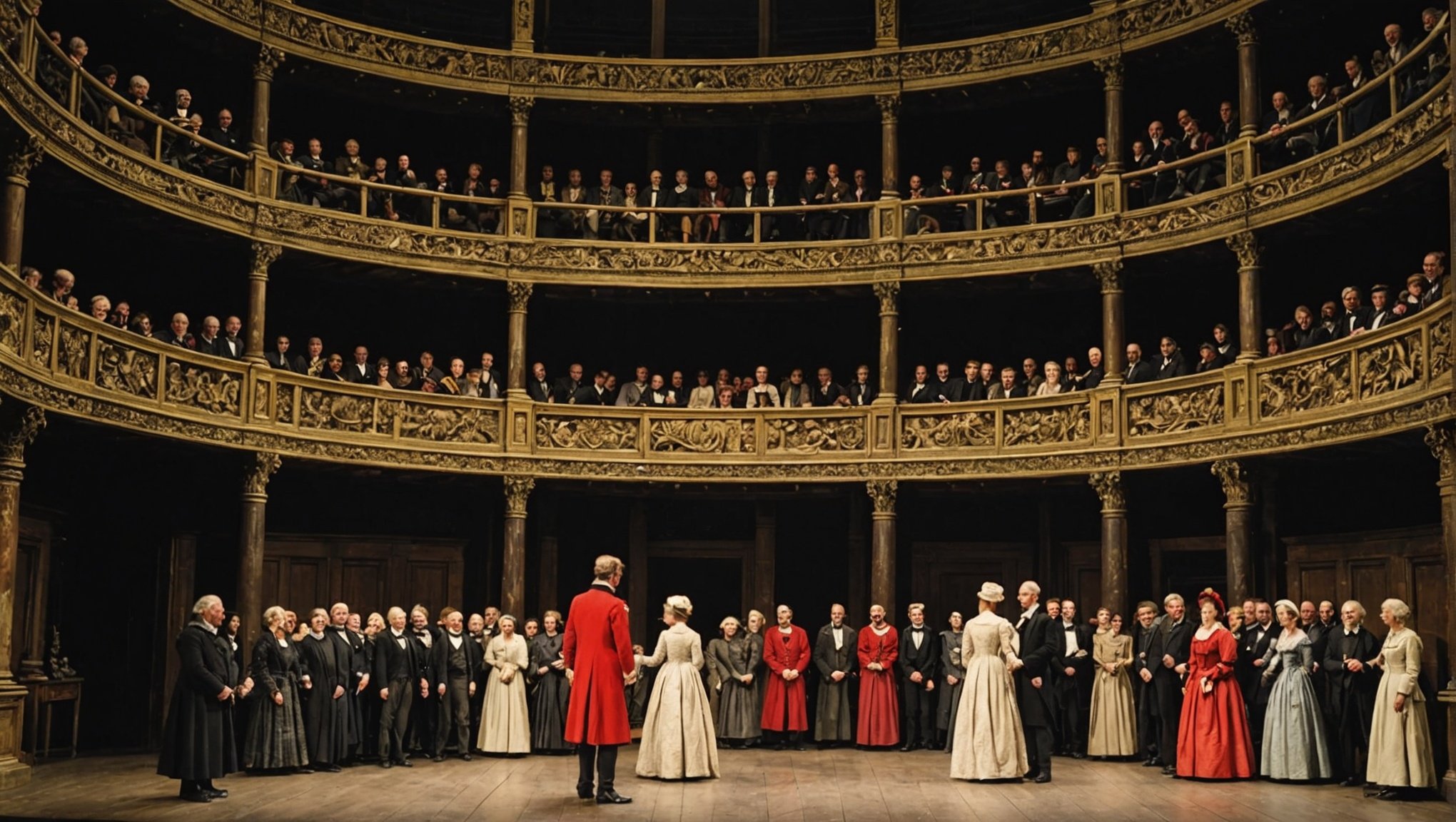British theater boasts a rich tapestry of history, captivating audiences with its innovative storytelling and performances. Guided tours in London offer a unique opportunity to explore iconic venues and uncover the fascinating stories behind them. From Shakespeare’s Globe to the vibrant West End, each stop reveals how theater has shaped British culture. Discover the unforgettable experiences that await as you walk in the footsteps of legendary playwrights and actors, and understand the artistry that continues to inspire generations. Experience this living history firsthand and let the magic of theater ignite your imagination.
Overview of British Theater History
British theater history is a rich tapestry woven with significant milestones and influential figures. The evolution of British theater can be traced back to medieval times, with mystery and morality plays serving as early forms of dramatic expression. The Renaissance period marked a pivotal shift with the emergence of notable playwrights like William Shakespeare and Christopher Marlowe, who shaped the theatrical landscape with their innovative storytelling and complex characters.
Also to discover : Maximize your london experience with the visit london pass
The significance of London as a hub of theatrical activity cannot be overstated. The city's theaters, such as the iconic Globe Theatre, have been central to the development and dissemination of British theater. London has long been a breeding ground for theatrical movements, reflecting broader cultural and social changes.
Major theatrical movements, such as the Restoration Comedy of the 17th century and the rise of melodrama in the 19th century, highlight the adaptability and diversity of British theater. These movements often mirrored the historical context of their times, offering audiences both entertainment and reflection.
In parallel : Uncover the best ways to visit the colosseum in rome
Prominent playwrights have continually influenced the theatrical landscape, introducing new styles and challenging societal norms. Their contributions have left an indelible mark on British theater, ensuring its enduring significance in the world of performing arts.
Iconic Theaters to Visit in London
Exploring London theaters offers a journey through history and architectural marvels. The Globe Theatre, a must-visit theater, stands as a tribute to Shakespearean drama. Its unique architectural features, including the open-air design and thatched roof, transport visitors back to the Elizabethan era. This theater has hosted countless renditions of Shakespeare's plays, making it a cornerstone of British cultural heritage.
The National Theatre, another iconic venue, showcases modern architecture with its bold concrete structure. Established in 1963, it has been pivotal in bringing diverse theatrical productions to the public. Its three auditoriums—Olivier, Lyttelton, and Dorfman—offer a variety of performances ranging from classic plays to contemporary works. The National Theatre's commitment to innovation and accessibility has cemented its reputation as a leader in the performing arts.
The Royal Opera House in Covent Garden is renowned for its opulent interior and rich history. Known primarily for opera and ballet, it has hosted legendary performances that continue to captivate audiences. Its architectural grandeur and acoustics make it a must-visit for theater enthusiasts.
These landmark theaters not only highlight London's rich theatrical tradition but also offer a glimpse into the city's evolving cultural landscape.
Guided Tours of London's Theater District
Embarking on guided theater tours is an enriching way to experience the vibrant London theater scene. These tours offer unique insights into the city's theatrical heritage, providing both historical context and behind-the-scenes glimpses.
Types of Guided Tours
There are various London theater experiences to choose from, catering to different preferences. Walking tours are popular for their intimate exploration of the theater district, allowing participants to soak in the atmosphere at a leisurely pace. Alternatively, bus tours provide a broader overview, covering more ground and offering a comfortable ride through the bustling streets.
Highlights of Popular Tours
Notable tours often include visits to iconic venues like the Globe Theatre and the Royal Opera House. Participants can expect to learn about the architectural marvels and historical significance of these landmarks. Some tours also offer access to backstage areas, providing a rare look into the workings of a theater production.
Tips for Tour Participants
To make the most of your guided tour, consider these recommendations:
- Wear comfortable shoes for walking tours
- Bring a camera to capture memorable moments
- Engage with guides and ask questions for deeper insights
These tips ensure a fulfilling experience, allowing you to fully appreciate the rich tapestry of London's theater district.
Renowned Playwrights and Their Impact
British theater has been profoundly shaped by the works of influential playwrights such as William Shakespeare, George Bernard Shaw, and Harold Pinter. These British playwrights have left an indelible mark on the theatrical landscape, each contributing uniquely to the art form.
William Shakespeare is arguably the most iconic figure in British theater, whose plays have transcended time and culture. His mastery of language and character development set a high standard for dramatic storytelling. Shakespeare's works continue to influence modern playwrights and remain a staple in theater repertoires worldwide.
George Bernard Shaw, known for his sharp wit and social commentary, revolutionized British theater with plays that challenged societal norms. His works often addressed political and social issues, encouraging audiences to reflect on the status quo. Shaw's influence is evident in the continued relevance of his plays, which are celebrated for their intellectual depth and humour.
Harold Pinter introduced a new style of writing characterized by sparse dialogue and dramatic pauses, known as "Pinteresque." His plays often explore themes of power and communication, leaving a lasting impact on contemporary theater. Pinter's legacy is seen in the works of playwrights who draw inspiration from his innovative techniques and thematic exploration.
Theatrical Milestones in London
London's theater scene has been shaped by numerous significant performances that have left an indelible mark on British theater history. These landmark productions have not only entertained audiences but have also reflected and influenced societal changes over time.
One of the most pivotal theater milestones was the debut of Shakespeare's "Hamlet" at the Globe Theatre, which redefined character complexity and dramatic storytelling. Such performances have continued to inspire countless adaptations and interpretations.
Societal changes have often been mirrored in theatrical productions. For instance, the post-war era saw a surge in plays addressing social issues, with productions like John Osborne's "Look Back in Anger" challenging traditional norms and sparking the "angry young men" movement. These plays provided a platform for discussing pressing societal concerns and pushed the boundaries of theatrical expression.
Recognition through festivals and awards has further highlighted theatrical achievements. The Olivier Awards, for example, celebrate excellence in professional theater and have become a benchmark for success in the industry. Similarly, the Edinburgh Festival Fringe showcases diverse and innovative performances, offering a stage for emerging talents and experimental works. These events underscore the dynamic and evolving nature of London's theatrical landscape.
Visitor Tips for Experiencing London Theater
Exploring London's vibrant theater scene can be an unforgettable experience with the right theater visitor tips. When it comes to purchasing tickets, booking in advance is advisable to secure seats for popular shows. Websites like the official London Theatre website offer reliable options. For last-minute plans, consider visiting the TKTS booth in Leicester Square for discounted tickets.
Timing your visit can enhance your theater experience. The best times to visit theaters are typically during weekday evenings or matinee performances, which often have fewer crowds and better ticket availability. This allows for a more relaxed atmosphere, ideal for enjoying the performance.
Enhance your theater outing with local dining and lodging options. The West End is peppered with an array of restaurants catering to diverse tastes, from traditional British pubs to international cuisine. Dining before or after a show can add to the experience. For lodging, consider staying at hotels near major theaters for convenience. Areas like Covent Garden and Soho offer numerous accommodation options, placing you at the heart of London's cultural hub.
These London travel advice tips ensure a seamless and enjoyable theater visit, allowing you to fully immerse yourself in the city's rich performing arts scene.






